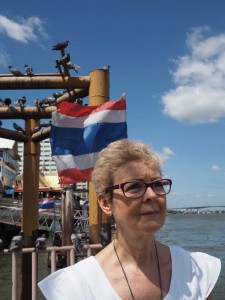
Ten percent of the Danes dying in Thailand end up being cremated at a random monastery, having their ashes shed into an unknown grave. According to the Danish Consul this can be avoided.
‘Chopped up and fed to the vultures’, that is what Norwegian Explorer Carl Bock saw happening to people, without money for a proper funeral, back in the late 19th century Thailand. Today the fate of the bodies nobody wants might not be as gruelling as 150 years ago. But just the thought of ending up as an unwanted body might be unsettling to some, and according to Birgit Sarah Carlstedt, the Consul at the Royal Danish Embassy, one in ten Danes who dies in Thailand actually ends up as unwanted bodies.
So even though this destiny might seem distant, lacking the proper preparations quite a few expatriates ends up getting cremated with stranger, having their ashes scattered over the river or into an unknown grave.
The cost of sending a body home is around 35.000 DKK. It includes embalming, a metal coffin and all documents needed. Sending an urn home is approximately 11.000 DKK, and once the ashes or body has arrived there will still be a funeral to pay for.
The family at home may not be able to pay expenses this high. Some might not have savings to spend. A lot of people have not made any arrangements before they die, this is one of the reasons why so many Danes end up as unwanted bodies.
Death is just the beginning
Finding out who is to decide where your final resting place will be, is just the beginning of the legal trouble concerning your death in Thailand. The question of inheritance is at least as tricky.
Different rules apply in different countries, and who will inherit what depends on your marital status, which address you are registered to and if you have written a will. The rest of the article can usefully be read as a guide to avoid the trouble and dispute the ones you left behind risk ending up in, if you die in Thailand and haven’t made arrangements in advance.
Registration, documentation, legalization
According to the Danish Consul Birgit Sarah Carlstedt a lot of the deceased have not made arrangements in connection with their deaths. The lack of preparation combined with the fact that they have died in Thailand is making an often complex situation even more chaotic.
“In Denmark there is a clear rule as to who is your next of kin all the way to the most distant relative. In Thailand the married partner gets it all. If you are not married but just living as a couple, the one left behind has no rights, unless the person can prove to the court that they had joint earnings while living together. This applies even if you have lived together 25, 30 or even 40 years,” Birgit Sarah Carlstedt says.
If you want your partner to inherit your possessions, her advice is to get married and to register your marriage in both countries. If the marriage is not registered in your home country, your closest relatives in that country might be called in court instead of your spouse.
When death occurs in Thailand the most important document for a spouse is the death certificate together with the Court’s Order appointing the heir. The documents are used to get the corpse from the hospital, money from bank accounts and to get the deceased erased from the house registration book. The Thai death certificate can only be used in Scandinavia when translated and the Embassy and the Thai Ministry of Foreign Affairs have legalized it.
Write a will
If you want to avoid a conflict between a Thai-spouse and the family at home, the best thing you can do is to write a will. It is your own will and you can choose exactly who and what to include, as long as it is within the rules of the law on heritage.
“We recommend writing a will, so that everybody will know the last wishes of the deceased. Where the person wants to be buried and who is going to inherit what.”
To make sure your will is valid in Thailand, you should have it translated and legalized by the Thai Foreign Ministry and the Danish Embassy. And if made in Denmark the will must be translated and then legalized by the Danish Ministry of Foreign Affairs and the Danish Embassy.
The rights of a relative
If you are registered with a permanent residence in Denmark, the Danish law of inheritance will apply. If your permanent address is in Thailand, Thai rules will apply. This means that if you have values in both countries, and your permanent address is in Thailand, the inheritance will be distributed according to Thai rules and vice versa. Sometimes scenarios like this can be troubling to a family at home.
”We have been contacted by children of Danish expatriates saying ‘But listen you have to do something, our parent is Danish‘ but we cannot help, and we cannot take sides in a case. The only thing we can do is to encourage the children to contact the Thai spouse and find a solution.” Birgit Sarah Carlstedt says.
In some cases, a lawyer might be necessary. According to Birgit Sarah Carlstedt this is not as straight forward as it sounds.
”It is not that simple, because a Danish lawyer cannot operate in Thailand and a Thai lawyer cannot operate in Denmark. So you have to find lawyers that can cooperate.” She adds that the Danish Embassy will help by providing a list of lawyers in Thailand who are capable of handling such a case.
